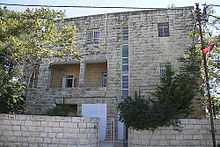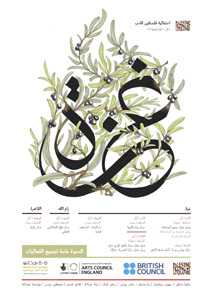Palestine Festival of Literature

PalFest (Palestine Festival of Literature) is an annual event that aims to bring a cultural festival of international standard to audiences in Palestine to assert "the power of culture over the culture of power." Patrons of the festival have included Chinua Achebe, John Berger, Mahmoud Darwish, Seamus Heaney, Harold Pinter, Philip Pullman and Emma Thompson. It is supported by the British Council, the Open Society, the A M Qattan Foundation and Riwaq among others.
Inaugural festival
Between 7 and 11 May 2008 the festival traveled to the cities of Jerusalem, Ramallah and Bethlehem - while the authors also visited Hebron. The venues included: Dar al-Tifl (Jerusalem), Al-Kasaba Theatre (Ramallah), Dar Annadwa (Bethlehem) and the Palestinian National Theater (Jerusalem) - all of which sold out. The format generally took on a series of a readings followed by discussions and questions from the audience.
The authors were also joined by Palestinian performers. In Bethlehem, El Funoun Dance Troupe performed a series of their dances and on the final night in Jerusalem, Yasmeen, from The Edward Said National Conservatory of Music, played. What was meant to be a sextet "turned into a quartet because the lute player and the percussionist were refused entry to the city".[1]
The festival also ran workshops with students at Bir Zeit University and Bethlehem University. Students were given a list of the attending authors and asked to come up with their own workshop titles.
The 16 artists in attendance of the 2008 festival were: Khalid Abdalla, Daniel Alarcon, Mourid Barghouti, Victoria Brittain, William Dalrymple, Roddy Doyle, Esther Freud, Nathalie Handal, Suheir Hammad, Ian Jack, Brigid Keenan, Jamal Mahjoub, Pankaj Mishra, Andrew O'Hagan, Hanan al-Shaykh, Raja Shehadeh, and Ahdaf Soueif.
2009 Festival

.
The 2009 festival toured to Jerusalem, Bethlehem, Jenin, Hebron and Ramallah over six days. The artists involved were: Suad Amiry, Victoria Brittain, Carmen Callil, Abdulrazak Gurnah, Suheir Hammad, Nathalie Handal, Jeremy Harding, Rachel Holmes, Robin Yassin-Kassab, Brigid Keenan, Jamal Mahjoub, Henning Mankell (accompanied by his wife, Eva Bergman), Deborah Moggach, Claire Messud, Michael Palin, Alexandra Pringle, Pru Rowlandson, Raja Shehadeh, Ahdaf Soueif and M G Vassanji.
On both the opening and closing nights attempts were made by the Israeli police, acting on court order, to prevent the festival from taking place, since the Palestinian Authority was involved.[2][3][4][5] Both times the festival relocated: to the French Cultural Institute on the first night[6] and to the British Council on the last.[7] Outside of Jerusalem, events and workshops were held in Jenin, Hebron, Bethlehem and Ramallah.
PalFest continues its work throughout the year, running extended writing workshops and videocast seminars wherever possible.[8]
2010 Festival

The 2010 Festival took place from 1 May to 6 May, with events in Jerusalem, Nablus, Jenin, Bethlehem, Hebron and Ramallah.[9]
Participants included: Susan Abulhawa, Taha Muhammad Ali, Suad Amiry, Geoff Dyer, Adam Foulds, Suheir Hammad, Nathalie Handal, Remi Kanazi, Henning Mankell, Raja Shehadeh, Ahdaf Soueif, William Sutcliffe, members of Wildworks theatre company - and many more.
An offshoot of the Festival has been the formation of the Palestine Writing Workshop - a series of extended creative writing courses run with small groups of students. To date, five week-long courses have been taught on topics ranging from spoken-word poetry to creative non-fiction.[10]
In October 2010 the first of PalFest's literary internships was launched: a young graduate from Hebron spent six weeks working at Bloomsbury Publishing in London, while two others were hosted by the Southbank Centre to work on their flagship poetry festival, Poetry International.[11]
2011 Festival

The 2011 Festival took place across the West Bank and saw the Festival's first event in Nazareth.
Participants included: Alice Walker, Lorraine Adams, Richard Price, Taha Muhammad Ali, Najwan Darwish, Suad Amiry, Susannah Clapp, Gary Younge, Mohammed Hanif, Ghada Karmi and Ursula Owen.
In 2011 the festival began refurbishing a historical building in Birzeit to create the Palestine Writing House (Beit Nimeh) in partnership with Riwaq and the Palestine Writing Workshop. The house currently holds a library and several working rooms for aspiring writers.
2012 Festival

The 2012 festival was held in Gaza, although the Egyptian Ministry of Interior was strict in issuing permits to enter through the Egyptian-Gaza border crossing at Rafah.[12]
In a press release, Festival Producer Omar Robert Hamilton said PalFest has always worked to forge cultural ties and called for regional and global partnerships to achieve justice for Palestine.[13] While previous years had seen the Festival conducted in both Arabic and English, in 2012 it was primarily conducted in Arabic with the authors drawn from around the Arab world and diaspora.
Participants included: Khalid al Khamissi, Alaa Abd El-Fattah, Amin Haddad, Selma Dabbagh, Jamal Mahjoub, Nariman Youssef, Youssef Rakha, Khaled Najjar, Sahar el Mogy, Amr Ezzat, Tariq Hamdan and the band Eskenderella.
At the same time, British authors Bee Rowlatt and Rachel Holmes led extended creative writing classes in Birzeit, at the Palestine Writing House, and joined Maya Abu el-Hayat, Abd al-Rahim al-Sheikh and Imad Sayrafi for a public event at the Sakakini Centre.
The closing event was shut down by Palestinian police forces. The chief of police apologised three hours later, stating it was an "individual error".
2013 Festival
In 2013 the Festival was held in cities across all of historical Palestine for the first time. To do this, two distinct festivals had to be created. PalFest South took place in Gaza, with visiting authors Ali Abunimah, Susan Abulhawa, Lina Attalah and Nora Younis travelling to Gaza to join Atef Abu Seif and Othman Hussein. PalFest North travelled to Jerusalem, Ramallah, Hebron, Haifa and Nablus. Visiting author China Miéville said the festival is "not only the most powerful and important literary festival it's ever been my privilege to attend, it's one of the most powerful and important things I've experienced, full stop[14]
References
- ↑ Ian Jack, "Hebron is a ghost town where joggers carry automatic rifles", The Guardian, 17 May 2008.
- ↑ Rory McCarthy, "Armed Israeli police close theatre on first night of Palestinian festival", The Guardian, 24 May 2009.
- ↑ "La police israélienne empêche la tenue du festival palestinien de littérature", Le Monde, 24 May 2009.
- ↑ "Police shut Palestinian theatre in Jerusalem", BBC News, 29 May 2009.
- ↑ The Progressive
- ↑ Video of the first day
- ↑ Video of British Consul General announcing new venue.
- ↑ Al Quds University's write-up of a videocast workshop.
- ↑ Raja Shehadeh writes in The Guardian
- ↑ Downloadable reports on the Palestine Writing Workshops: http://www.palfest.org/downloads.html
- ↑ SouthBank Centre Intern's Blogs.
- ↑
- ↑ Guardian article, 2 May 2012: http://www.guardian.co.uk/books/2012/may/02/egyptian-writers-plea-gaza-permits-palfest
- ↑ PalFest 2013 Report
External links
| Wikimedia Commons has media related to PalFest. |
- Official Website
- Robin Yassin-Kassab on PalFest in PULSE Media
- Claire Messud on PalFest in the Boston Globe.
- Deborah Moggach on PalFest in The Guardian.
- Ursula Owen's account of attending the 2011 PalFest on History Workshop Online
- Samir Galal Mohamed on PalFest 2014 in La Città Nuova, Corriere.it, November 26, 2014.